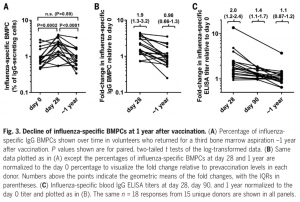 Viral strains that cause influenza (flu) change annually, as a result, a new flu vaccine that aims to induce immunity to new influenza strains is provided annually. One of the strategies of the flu vaccine pipeline is to develop a universal flu vaccine that could generate protective immunity to multiple influenza strains, without the need for annual vaccination. However, vaccine-induced influenza immunity declines rapidly presenting a challenge for long-term vaccine induce immunity. Bone marrow plasma cells (BMPCs) play an important role in maintaining serological IgG antibody (Ab) titres and have been shown to correlate with antigen-specific antibodies. Researchers (Davis et al.,) thus aimed to track BMPCs and Ab titres induced by flu vaccination in 53 volunteers.
Viral strains that cause influenza (flu) change annually, as a result, a new flu vaccine that aims to induce immunity to new influenza strains is provided annually. One of the strategies of the flu vaccine pipeline is to develop a universal flu vaccine that could generate protective immunity to multiple influenza strains, without the need for annual vaccination. However, vaccine-induced influenza immunity declines rapidly presenting a challenge for long-term vaccine induce immunity. Bone marrow plasma cells (BMPCs) play an important role in maintaining serological IgG antibody (Ab) titres and have been shown to correlate with antigen-specific antibodies. Researchers (Davis et al.,) thus aimed to track BMPCs and Ab titres induced by flu vaccination in 53 volunteers.
Davis et al., detected influenza-specific BMPCs and IgG/IgA Abs in volunteers before vaccination. This immunity was due to previous flu vaccination and flu episodes. New seasonal flu vaccination significantly increases influenza-specific BMPCs and IgG/IgA Ab titres, however, 1-year post-vaccination vaccine-induced immunity declined to similar levels as baseline. Using clonotype-tracking researchers attributed this contraction of humoral immunity to loss of newly-generated vaccine-specific cells. These results present a potential challenge for a universal flu vaccination strategy as vaccine-induced immunity declines rapidly. Detection of robust immunity before recent vaccination suggests that there is hope for inducing life-long Ab immunity. Thus future vaccine strategies should aim to induce long-lived BMPCs that have undergone gene expression and metabolic changes required to promote longevity.
Journal Article: Davis et al., 2020. Influenza vaccine–induced human bone marrow plasma cells decline within a year after vaccination. Science
Summary by Cheleka AM Mpande










